Chris Whitty giving evidence nowpublished at 11:44 BST 22 June 2023
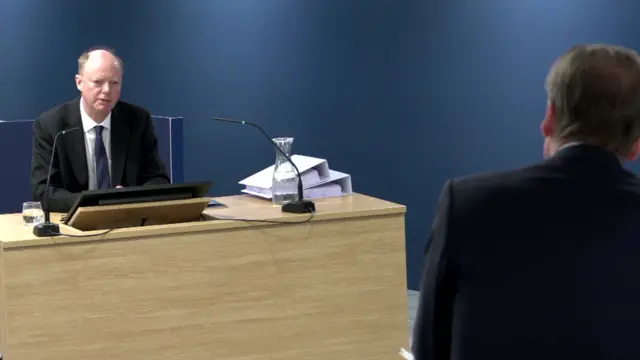
A face that will be familiar to many, Sir Chris Whitty is now giving his evidence.
Stay with us for updates and watch live at the top of the page.
The government's chief scientific adviser during the pandemic, Sir Patrick Vallance, is giving evidence to the inquiry
The chief medical adviser, Sir Chris Whitty, earlier said that lockdown was a "very radical thing to do"
He called the lockdown "extraordinarily major" and a "big new idea" that wasn't considered in advance
He also told the inquiry he saw the damage from the disease "first-hand" as a working medic
Earlier, Cobra chief Roger Hargreaves talked about the emergency regulations in the Civil Contingencies Act never being used
You can watch the hearings by pressing play at the top of the page
Edited by Jamie Whitehead

A face that will be familiar to many, Sir Chris Whitty is now giving his evidence.
Stay with us for updates and watch live at the top of the page.
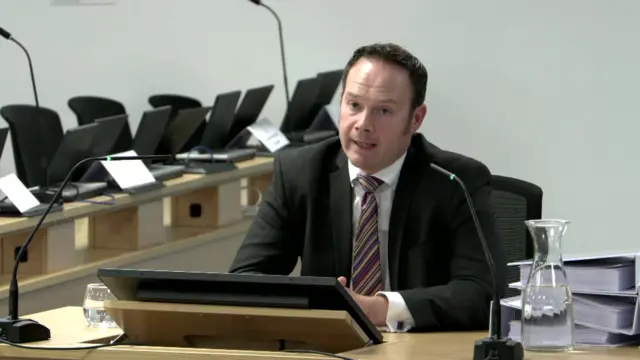
Let’s look back now at Roger Hargreaves’ evidence this morning.
Initial questions aimed at him were about Cobra - Cabinet Office Briefing Rooms – which he is director of, and he said that Cobra only dealt with the initial phase of the Covid pandemic.
He also talked about the Civil Contingencies Act of 2004 - and that the emergency regulations on it were never used.
When he was asked about his thoughts on the National Preparedness Commission, he said that it was one of many reports that the government receives and he did not prioritise its comments over others.
That's all from Cobra director Roger Hargreaves and there will now be a 15 minute break.
Stick with us - Chris Whitty is coming up
Hugo Keith KC asks Cobra director Roger Hargreaves about his thoughts on the National Preparedness Commission - an independent body which he says called for an overhaul of the 2004 Civil Contingencies act.
Keith says the report had 117 recommendations, including to impose legal duties on central government in the context of public emergencies. The report concluded that there were weaknesses to UK resilience and that it was "not fit for purpose", Keith adds.
Hargreaves says the National Preparedness Commission is one of many reports that the government receives and he did not prioritise its comments over others.
Hargreaves adds it is focused on moving parts of the system in doing civil protection work, whereas the government is focused more on "preventative work", and "broad public engagement in risk" because "that is what shapes people's actions".
But he also says there is a lot in the report he would agree with.
 Laura Foster
Laura Foster
Health correspondent, reporting from the inquiry
Sir Patrick Vallance arrived at the UK Covid-19 inquiry just before 11:00 BST.
He walked straight into Dorland House without stopping to look over at the media waiting outside.
As the UK Government’s chief scientific adviser, he made regular appearances at Downing Street press conferences during the pandemic and set up the UK vaccine taskforce.
He had held the post since April 2018, only stepping down in April this year.
 Hugh Pym
Hugh Pym
Health editor
And the momentum won’t ease up next week as the inquiry probes UK preparedness for a pandemic.
Former Health Secretary Matt Hancock and the former head of Public Health England Duncan Selbie will give evidence on Tuesday.
Then the focus shifts to decision making by the Scottish Government with former Chief Medical Officer Catherine Calderwood, former First Minister Nicola Sturgeon and former Deputy First Minister John Swinney.
There is a separate public inquiry in Scotland chaired by Lord Brailsford but the UK public inquiry chair Baroness Hallett has made clear that each of its modules will look at issues across the UK as a whole including in the devolved administrations.
Hargreaves is now being asked about the Civil Contingencies Act of 2004 - which sets out how to plan and respond to a public emergency.
He says there were no post-implementation reviews in the five years after the legislation was enacted, because there was no post implementation review policy in place until 2009.
The first post implementation review was in 2017 - 13 years after it was enacted.
Hargreaves says despite this there is an awful lot of consideration as to whether the act works in practice. He draws on an example between 2007 and 2008 when an independent reviewer looked at the implementation of the act in response to flooding in parts of the UK.
He says none of the reviews recommended a broad departure from the act.
Back to the hearing now and Roger Hargreaves is asked more questions about the split between Cobra and the resilience directorate.
He is asked “How well did the specific crisis management capacity perform in the early days of the Covid pandemic?”, and replies “I wasn’t there”, before adding “I observed from outside”.
When questioned if Cobra was utilised fully and consistently or over time was it replaced by other structures, he says “Yes, it was replaced.”
“Cobra was there to deliver when there is a crisis, it establishes control. And then it requires a different kind of management…The pandemic was a particular kind of national challenge. It took the form of a kind of emergency between a crisis and a kind of territory of business as usual where you need to establish policies. Cobra dealt with the initial phase.”
 Laura Foster
Laura Foster
Health correspondent, reporting from the inquiry
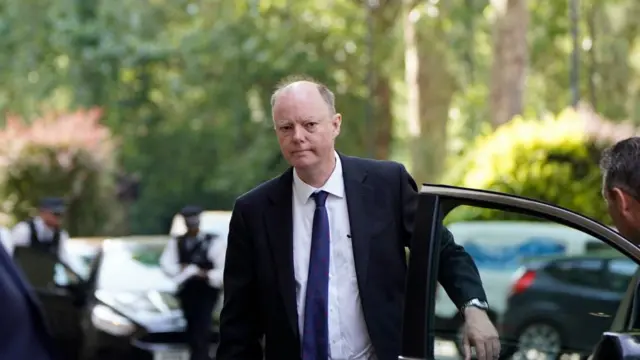 Image source, PA Media
Image source, PA MediaSir Chris Whitty arrived at Dorland House in Paddington in a black car at half past eight this morning.
That’s an hour and a half before he was due to begin giving evidence, but his appearance is now after the director of Cobra, Roger Hargreaves.
He’s wearing a suit and tie and he looked briefly over at the press as he walked briskly inside.
How did he seem? I’d say he looked calm and focused – similar to how he looked at various Downing Street press conferences during the pandemic.
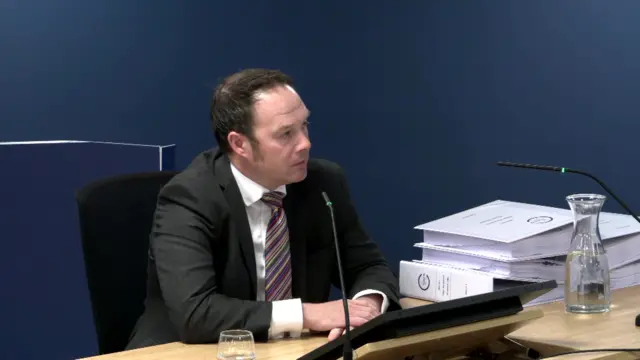
After being sworn in, Hargreaves - current director of Cobra - is asked about why the secretariat unit was split in two between the response and planning side.
Hargreaves says it was important to split the role because there needed to be a "tighter focus" on crisis management delivery.
He says there is a danger the response phase "draws you in", meaning people engaged in the longer-term planning are disrupted.
 Laura Foster
Laura Foster
Health correspondent, reporting from the inquiry
Initial questions aimed at Roger Hargreaves have been about Cobra - Cabinet Office Briefing Rooms – which he is director of.
Hargreaves says Cobra “is there to deliver a crisis response to an acute moment.
“A catastrophic emergency like Covid…requires a different kind of management.”
He says “you need something that will keep going week on week, month on month and that’s not really Cobra”.
We are under way.
Baroness Heather Hallett, who is chairing the hearings is seated and Roger Hargreaves, who is the current director of Cobra is up first
You can watch all the evidence by pressing play above.
We'll have text updates and analysis all day.
 Nick Triggle
Nick Triggle
Health correspondent
The appearance of the two highest profile scientists in the pandemic – Prof Sir Chris Whitty and Sir Patrick Vallance– at the inquiry will shift the focus from ministerial decision-making to scientific advice.
Expect both to be quizzed on why the UK’s pandemic plans were based on flu and the idea of building up herd immunity by letting a new virus run through the population rather than doing more to stop it getting in or at least slowing its spread.
While Sir Chris only took up the post of chief medical officer in 2019, he had previously worked within government for 10 years.
On Tuesday his predecessor Prof Dame Sally Davies admitted she should have done more to challenge the groupthink on how best to approach the pandemic.
This approach was not unique to the UK – many parts of Europe and North America had similar plans.
But as we have been hearing this week, the plans were found wanting.
Today, we are expecting to hear from scientists who were in charge of advising the government during the pandemic.
We'll hear from Roger Hargreaves, who is the current director of Cobra and then Sir Chris Whitty, who has been chief medical officer for England since 2019.
Later, we’ll hear from Sir Patrick Vallance, government chief scientific adviser between 2018 and 2023.
And finally, Dr Jim McMenamin, who is Head of Infections Service at Public Health Scotland, will give evidence on Scotland's readiness on the pandemic.
They'll all be giving evidence as this first phase - focused on the UK's preparedness ahead of the pandemic - of the inquiry continues.
Stay with us for live updates.
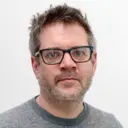 Jamie Whitehead
Jamie Whitehead
Live reporter
It’s day eight of the public hearings of the inquiry into how prepared the UK was for the pandemic.
And it’s a big day. You’ll remember both Sir Chris Whitty and Sir Patrick Vallance from the daily press briefings at the height of the pandemic, well it’s their turn to give evidence today.
Today we’re also going to hear from Roger Hargreaves and Dr Jim McMenamin. We’re due to get underway at 10:00 BST.
I’ll be here to guide you through the day along with Ece Goksedef and James Gregory and we have our science reporter Laura Foster reporting from the inquiry as well, which you can watch live at the top of the page.
Stay with us.
Heather Sharp
Live reporter
We're pausing our coverage of the Covid Inquiry for now, but we'll be back tomorrow when we're due to hear from two key scientific figures in the UK's pandemic response.
In the morning, we'll hear from Sir Chris Whitty, who has been chief medical officer for England since 2019 - and in the afternoon, Sir Patrick Vallance, government chief scientific adviser between 2018 and 2023.
They'll be giving evidence as this first phase - focused on the UK's preparedness ahead of the pandemic - of the inquiry continues.
Today's page was brought to you by Alexandra Binley, Emily McGarvey, Dulcie Lee, Laura Gozzi and myself, together with health correspondent Nick Triggle and health reporter Jim Reed.
 Nick Triggle
Nick Triggle
Health Correspondent
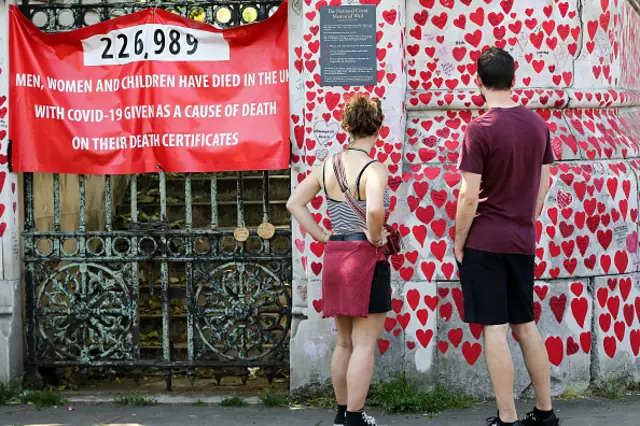 Image source, get
Image source, getTwo ministers and one scientist have given evidence today across a broad range of issues, but one key topic is beginning to dominate these opening weeks of the inquiry: why didn’t the UK in its planning consider trying to stop a pandemic virus getting a hold.
The approach - and it was one much of the western world adopted too - was essentially to let the virus run through a population to build up herd immunity.
This was not just a ministerial decision, it was one adopted by the scientific community.
In fact, the UK was lauded by a leading research body in 2019 for its pandemic planning, judging the UK to be the second best prepared.
These plans were based on a flu pandemic - and one which was not so deadly.
But in South Asia a different approach was taken after their experience with Mers and Sars, both of which are coronaviruses.
They invested in testing and quarantining to try to slow the spread of the virus from the off. They were by-and-large successful, keeping deaths down during the first wave.
Chancellor Jeremy Hunt, who served as health secretary between 2012 and 2018, called it a “blindspot”.
Why this happened will need to be explored further in the coming weeks.
This afternoon it was Chancellor - and former health secretary - Jeremy Hunt's turn to give evidence at the Covid-19 inquiry.
Here's a recap of what he said:
Here's a little bit more of what former Health Secretary Jeremy Hunt said earlier, as he spoke about the government's failure to learn lessons from the experiences of countries such as South Korea when it dealt with the Mers virus.
He said quarantining people sooner "might have avoided" the first lockdown.
He said: "If there was one thing that could have slowed the progress of Covid when it actually arrived, it was to understand the importance of early quarantining to stop the disease spreading, and to understand there are types of pandemic where it is worth putting a massive amount of effort into slowing the spread."
He added: "One of the very first [questions] we should have been asking ourselves is, 'is this one of those pandemics that you can actually slow and save lives early on or not?' And I don't think we had asked those questions," Hunt said.
By the time the first UK lockdown happened, "transmission had increased to about 5,000 a day... Had we got on the case much earlier with [a lockdown], we might have avoided that," he said.
The hearing has now concluded for today - but do stay with us as we look back at what we've heard from Hunt and others.
Meanwhile, here's a quick reminder of some of the key things to know about the UK's Covid inquiry.